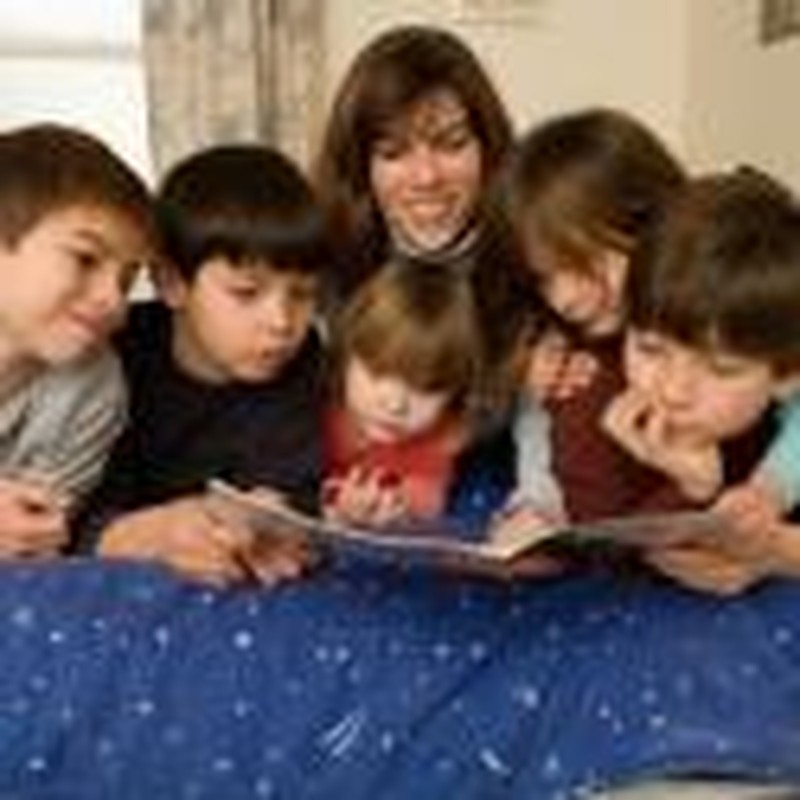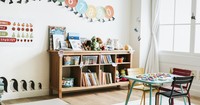The Importance of a Family Read-a-loud
- Paula Moldenhauer
- Published Mar 16, 2007

A whine started with one boy and echoed through my classroom. "Do we have to read?"
Mouth agape, I stared at my students. Where did that attitude come from?
Just a few years before, the scene was totally different. Not only did my students listen eagerly when it was time for me to read aloud, but they often begged me not to stop! There were never groans when I began reading, only groans when I'd leave them hanging at the end of a good chapter.
The children I'm talking about are not found in a public school. They attend a class I've taught for a homeschool coop for the last eight years. Somewhere down the line, listening to a good book changed from a desired activity to a rejected one. What happened over the years to give such stark contrast between the class of 1998 to the classes of 2007?
Much is the same. Both classes were comprise of primarily homeschooled boys between the ages of 7 and 12 and had approximately 25 students. The books were very similar--in fact, if my memory serves me, they were by the same author! And I still do all the great voices when I read. So why are things so different than when I first started years ago? Why do I see a measurable decline in the attention span of my students and in their love of story?
I first began pondering this question at a homeschool conference, which focused on the importance of reading and the concern about the decline of the reading of literature in the US. Then, just this week I read a magazine talking about similar issues. Both sources referenced the same study, "Reading at Risk."
Released in 2004 by the National Endowment for the Arts, "Reading at Risk," studied the literary practices of adults in American and reported drops in literary reading among all ages groups, with the steepest rate of decline (28%) occurring in the youngest age groups. It further stated that the overall rate of decline accelerated from 5 to 14 percent since 1992.
Could I be seeing the results of literary decline in my own homeschool community? I'd thought homeschoolers were exempt from the concern of a drop in reading literacy.
Now I'm not so sure. My students today seem less accustomed to listening to a book. They fidget more. Fewer students are eager to answer my questions when we discuss the story. If I say, "Who can tell me what happened in the story when we read last time?" I'll only have a couple of students who've retained the storyline and are eager to share. I used to have several. I'm willing to admit that every class has a different personality and it could simply be a result of different leadership, but I think the issue is important enough that we must ask the question: have homeschoolers, too, began to lose focus on literature?
It is possible we are experiencing new trends in homeschooling that may relate to this issue. For example, in the early days of homeschooling, very little curriculum was available to homeschoolers. Resilient homeschool moms, God bless them, trekked to the library and built their own curriculum around great literature. Today, not only do homeschoolers have access to just about every curriculum a private Christian school can purchase, there has also been a plethora of curriculum designed specifically for homeschoolers. I'm grateful I have so many options and buy my curriculum alongside the best of homeschool moms. But I'm wondering if with the ease of acquiring curriculum we have forgotten the foundation of reading together. It can be easy to send the kids to their workbooks instead of taking time together with a good book.
Recently, a young mom asked me about the family read-a-loud. Though an avid reader herself, no one read to her as a child and it was a foreign concept to her. When she first heard the idea and tried it at home, she wasn't met with success. The kids fidgeted and grumbled. Instead of the happy environment she imagined, anarchy ruled!
Perhaps you've had a similar experience and wonder if reading aloud is worth the effort. I'd like to share why I believe a family read aloud time is important and how to help children adjust to and enjoy this precious time.
Looking at the big picture, fostering literary reading is important for the health of our culture. "America can no longer take active and engaged literacy for granted," according to National Endowments chairman, Dana Gioia. "As more Americans lose this capability, our nation becomes less informed, active, and independent minded. These are not qualities that a free, innovative, or productive society can afford to lose."
Bringing it home, there are several good reasons for creating a literary environment by reading to your child. First, reading together fosters relationship and encourages skill development. There's something special about cradling a child on your lap and reading a good book. When a child equates reading with parental affection, he is transferring a positive feeling to an important skill and is more likely to want to read himself.
Second, when you read aloud to your children, you can read books above their reading level. This develops the child's vocabulary. She is more likely to read a new word later when it is part of her receptive vocabulary, even if is has not been previously introduced in her reading studies. Language is first receptive. You hear it. Then you speak it, reproducing it verbally. It is only after these two stages are completed that you can read language or produce it on the written page. Developing your child's vocabulary through reading good literature increases their reading and writing skills.
Third, reading good literature shapes a child's beliefs about themselves, God, and the world. When you read together, you have an opportunity to discuss themes of the story and impart to your child your own schemata of life. Things like compassion and morality come through in a good story with much more impact than a lecture ever could. Some of the best discussions I've had with my children about life and God and the big issues of our world have come as we've read a good book.
Recently, I attended a conference in which Sarah Clarkson, who graduated from homeschool a few years ago, shared the impact literature has had upon her life. She talked about how reading Tolkein had helped her find her own passion and step into God's calling for her life. "Books help us believe in the epic spiritual story," she said.
My own daughter tells me that while some Bible stories have become mundane, God has met her with the same passions and deepened understanding of the Bible stories she's memorized as she's experienced similar themes in literature. My sons, too, have been greatly impacted by the family read a loud time. It's amazing to me how they will bring up scenes or themes from the books we read earlier in the day when I tuck them in bed at night. I love it that they've spent the day processing and want to think it through with me before they go to sleep.
Perhaps you're convinced that incorporating more reading time into your homeschool schedule is important, but like my friend, you haven't discovered how to do incorporate a family reading time with positive results. Here are some ideas that worked for us.
I began reading to my children before they could walk. My house was filled with simple board books. The kids slobbered on them, carried them around, and jabbered to them. Eventually, they would bring their little books to me, crawl onto my lap, and ask me to read to them. I'd even catch them "reading" to their stuffed animals or younger siblings.
Soon we progressed to books with more words on the page and the endless trips to the library began. I tried to find books that would hold my children's attention and didn't force stories upon them that had too many words on the page for the amount of time they were interested in the picture. That's not to say my kids never started to wiggle off my lap or turn the page before I was ready. But I kept reading and sought to tailor that read a-loud-time to their attention span.
Honestly, I received some criticism about this at homeschool conventions where vendors were absolutely convinced that their books were geared for an average four-year-old, but I disagreed. Many times I had to go with my gut feeling about what books would hold my children's attention, even when I secretly feared my children were behind schedule as vendors tried to convince me to buy something I felt was not age appropriate. A mom knows her children better than anyone else. When choosing books, don't feel pressured to choose literature someone else believes you must have. Step back and ask yourself what will really work in your home, and make your decisions based on that, not on pressure, guilt, or insecurity.
I also found that when the children were little, several short reading times together throughout the day worked much better than one long one. I wanted kids to love reading, not feel forced into it, but I also knew I had to consistently build into them in this area. All of my children, especially the boys, were active and on occasion resistant to the family reading time. Strive for the balance between asking more than is wise from your children and going to the other extreme of letting them dictate whether or not you have reading time together. There are time to let them squirm and times to coax them to sit on your lap and listen. You will know this balance better than anyone else.
As the children got older, the books progressed from picture books to chapter books. I discovered they would listen longer if I allowed them to draw or build with blocks while I read. By this time we also had younger children who couldn't be still while I read to the big kids, but that didn't change the need for the older children to hear more difficult books. Many reading times have been shared with toddlers playing with matchbox cars and older siblings building with Lincoln Logs. As all four children grew older, I'd often assign each child a drawing lesson from Hablitzel and Stitzer's Draw Write Now books and they'd work on pictures while I read to them. I've read at the kitchen table while the kids peeled potatoes for dinner or apples for pie. I've read at the park, in the living room, and sitting in our neighbor's yard while the kids licked popsicles.
Sally Clarkson of Whole Heart Ministries (www.wholeheart.org) says she often lit the fireplace and served her children hot chocolate, or popped a huge bowl of popcorn to entice them into listening to her read. Sally says that as long as her children could narrate back to her what the story was about, she allowed them to do quiet activity while she read.
When I read, I have just one rule. You can't do anything that will distract the reader or those listening. That means no talking. No picking at your brother. (I've also had to limit car noises). Moms can discover what their own limitations are. For example, even as a teen my oldest son would shoot mini hockey pucks or bounce on a mini-tramp if I allowed it during reading time. He actually learns best when moving, but most of the time I just can't handle that much activity when I read aloud. Sure, he could narrate back to me while bouncing up and down, but I'm unhappy and his siblings are distracted, therefore I limit it.
When you choose selections for read-a-loud time, think carefully about your choice. It's good to choose books in which the vocabulary is slightly above your child's, but I also recommend variety. If you've finished a long, more difficult read-aloud, you might want to read an easier selection the next time. While I am careful to choose stories that promote the things I'm passionate about, like justice, compassion, courage, and integrity, I also believe there is great value to reading something for the sheer pleasure of laughing together at a funny story or getting lost in a wonderfully created imaginary world. Read books you love and the family read-a-loud will be more successful.
Research also indicates that a mother or father's voice reading to the child builds better learning for the child than listening to pre-recorded books. Some experts even suggest recording stories yourself so that your child can listen to books read by you even when you aren't available, like when you're driving the car or gone for the afternoon. While I do believe this is ideal, I also believe we should be careful not to become to legalistic about this. If you are reading consistently to your child throughout his lifetime, there is still much value in getting books on tape or CD at the library. As busy moms, we need to use the resources available to us without guilt! We don't have to do it all ourselves. This year has been particularly taxing for me. In this busy season, I am blessed by books on CD. Right now, instead of reading a great piece of literature to my children, we're listening to it read by a professional reader on CD. And guess what? While we listen I do those things that pile up and drive me crazy, like fold laundry, sew Cub Scout patches on uniforms, or mend someone's favorite shirt. When we're done with this book, I'll put away my needle and read to them myself again, but this break is a gift! As my children grow older and more involved outside activities, I have to work harder to schedule our read-a-louds, but it's worth it.
I encourage you to do what it takes to make the family read-a-loud a part of your homeschool. Fight through the issues that attempt to derail your efforts. Then enjoy the rewards of experiencing literature together while helping your child develop a better vocabulary, a deeper ability to think through big concepts, and a lifetime love of reading.
------------
A home schooling mother of four, Paula Moldenhauer is passionate about God's grace and intimacy with Jesus. Her website offers home schooling hints, book reviews, and a free weekly devotional, Soul Scents. Subscribe to Soul Scents at www.soulscents.us. You can contact Paula at Paula@soulscents




















